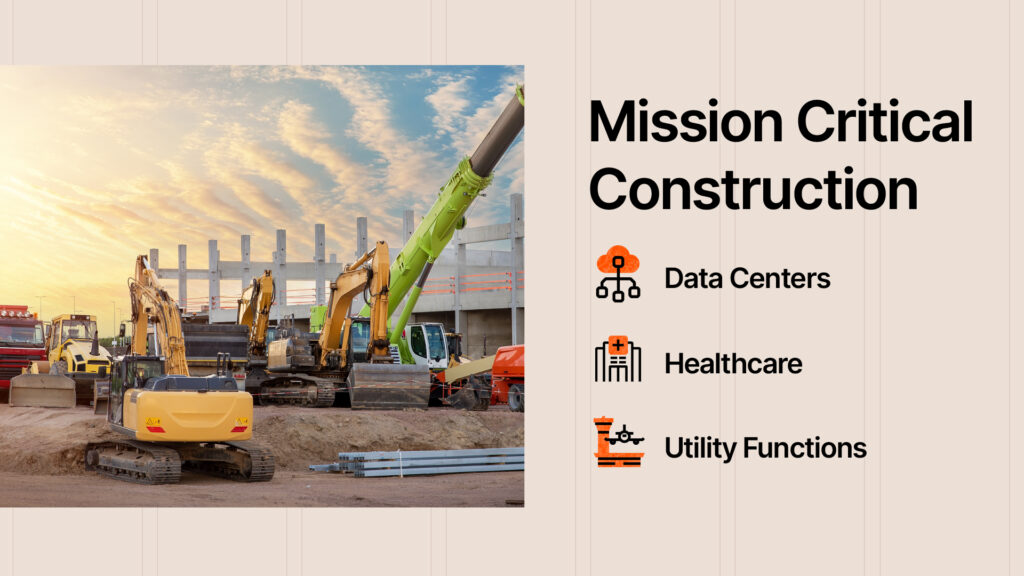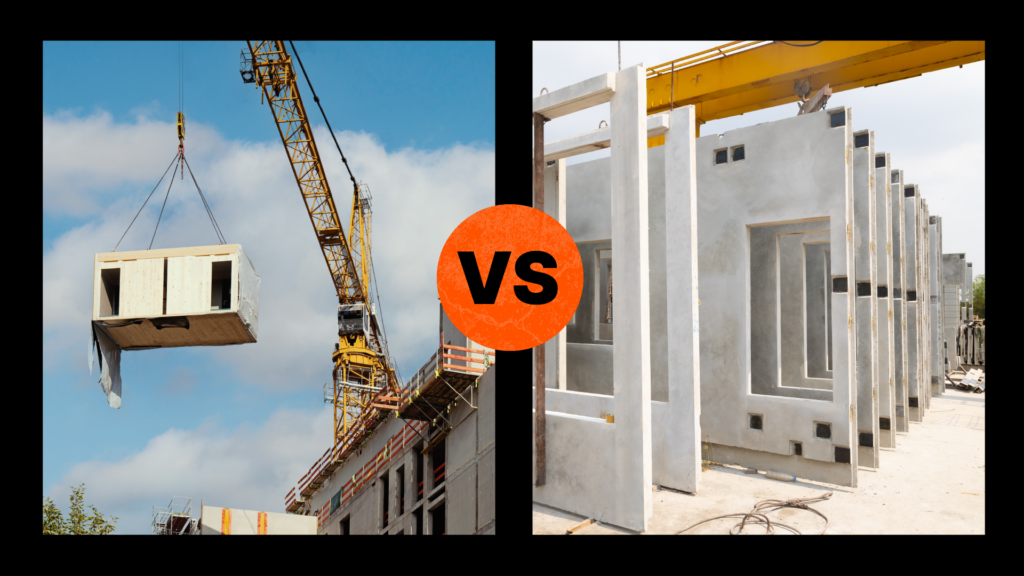— 9 min read
The Role & Responsibility of Specialty Contractors in Construction
Last Updated Mar 17, 2025
Last Updated Mar 17, 2025

Construction projects involve a variety of concurrent, coordinated efforts that necessitate a diverse range of expertise to successfully move from blueprint to physical structure. While general contractors typically oversee the entirety of a project, specialty contractors are crucial for handling highly specific aspects of the work. Specialty or trade contractors bring expert knowledge to tasks ranging from earthwork and asbestos abatement to sophisticated electrical installations, each playing a distinct role under or alongside the general contractor.
This article dives into the nuanced roles of specialty contractors, examining the types of specialty contractors and the specific expertise they bring. We explore how their direct involvement enhances project outcomes, the unique logistical and contractual challenges they navigate and best practices for managing them onsite.
Table of contents
What are specialty contractors?
The term "specialty contractor" identifies firms that focus exclusively on specific trades or aspects of the building process. This could include contractors with broad skill sets like a carpenter, or unique and extremely focused niche like an electric car charge port installer.
Types of Specialty Contractors
Specialty contractors cover a wide array of roles and services, each tailored to their specific field of expertise. There are many types of specialty contractors, including:
Earthwork contractors
Specialize in soil manipulation and site preparation, which are important for setting the foundation of construction projects
Asbestos Abatement Contractors
Handle the removal of hazardous asbestos materials, ensuring compliance with health and safety regulations
Electrical Contractors
Focus on the installation, repair and maintenance of electrical systems to meet safety standards
Plumbing Contractors
Manage the installation and maintenance of water, sewage and drainage systems
HVAC Contractors
Responsible for heating, ventilation and air conditioning systems, which are essential for environmental comfort
Roofing Contractors
Engage in roof installation and repair, vital for protecting buildings from environmental elements
Painting Contractors
Specialize in the aesthetic and protective painting and decorative coatings of buildings
Waterproofing Contractors
Provide solutions to prevent water penetration in various building areas, crucial for structural integrity.
Concrete Contractors
Choosing concrete, preparing the site, pouring and finishing — concrete contractors are involved in every step of using this important material.
Subcontractor vs Specialty Contractor
Though the terms “specialty contractor" and “subcontractor" may seem synonymous, there is a distinction between the two: a specialty contractor can be a subcontractor, but is not always a subcontractor.
The term subcontractor has been used as a catch-all term for contractors who perform specific trades — such as plumbers and electricians — but, technically speaking, a subcontractor is any contractor who has signed onto a job via a subcontract.
This distinction is necessary because there are cases in which the owner will hire a specialty contractor to perform specific works on a project, which can lead to interesting jobsite dynamics and management conflicts. And, not all subcontractors are specialty contractors either. It’s not uncommon for general contractors to hire other general contractor firms to take on specific phases of a project, technically making the second GC a subcontractor as well.
Specialties vs. Specialty Contractors
While specialty contractors are experts in specific construction trades, "Specialties" typically refers to particular products or installation services on a construction project. As detailed in Construction Specifications Institute (CSI) MasterFormat, the "Specialties" Division includes the procurement and installation of items like toilet partitions and fire extinguisher cabinet.
These specialties are often surface mounted and part of the finished trades, usually installed towards the end of the construction process. Coordination with manufacturers and suppliers is key to ensuring compliance with industry standards and codes.
Challenges of Specialty Contractors
Specialty contractors bring a deep understanding of a specific trade to a project, outfitting them with specialized skills and knowledge not typically offered by the general contractor or subcontractors.
Unlike traditional subcontractors who work under the general contractor's management, specialty contractors may contract directly with owners. This direct engagement can provide owners with more control over specific project components and may lead to clearer communication channels. However, this arrangement also introduces complexities in coordination and integration with the broader project management handled by general contractors.
Logistical Challenges and Jobsite Dynamics
Specialty contractors often deal with logistical complexities related to their specialized tasks. One common issue involves coordinating the timing of their work with other ongoing construction activities. This is critical as their work typically needs to be integrated seamlessly with the efforts of the general contractor and other subcontractors. For example, an earthwork contractor must carefully plan and execute their work to prepare the site before any building foundations can be laid, ensuring that their activities do not interfere with or delay subsequent construction phases.
Contractual Challenges
Specialty contractors often operate under separate contracts (subcontracts) that are distinct from the main contract managed by the general contractor, with little to no visibility of that prime contract between the GC and the owner.
This unique contractual arrangement can introduce challenges, particularly when project specifications change or when unforeseen issues arise and change orders must be first negotiated at the prime contract level before being finalized with the subcontracting parties. Navigating these changes while maintaining adherence to their specific contractual obligations often requires swift adjustments and clear communication with all parties involved.
The dual accountability to both the project owner and the general contractor can further complicate the situation for specialty contractors. They must fulfill the specific requirements detailed in their contract, often set by the project owner, while also aligning with the timelines and protocols set by the general contractor overseeing the project.
This scenario can lead to conflicts or misunderstandings if communication is not managed effectively. The precise nature of their contractual responsibilities might also expose specialty contractors to increased legal and financial risks, making robust contract management and proactive communication strategies essential. These measures ensure that specialty contractors can navigate the complexities of their roles effectively and contribute positively to the overall project outcomes.
Communication Issues
Effective communication poses a significant challenge for specialty contractors, especially in complex projects where their tasks intersect with those of other contractors. It is crucial for specialty contractors to maintain clear, ongoing communication with their client or the general contractor and other trade partners to avoid disruptions onsite.
Miscommunications can lead to serious issues, such as project delays, increased costs and compromised quality of work. For example, if a specialty contractor's work schedule is modified without informing all relevant parties, it could derail the entire project timeline.
Courses about construction.
For construction.
Unlock your career potential with our free educational courses on Health & Safety, Data in Construction, and more.
Managing Specialty Contractors
Whether a specialty contractor is hired on as a subcontractor by a GC or by the owner, the way general contractors manage specialty contractors requires a nuanced approach that considers both the complexities of contractual relationships and the operational dynamics on jobsites. Here are some best practices that can enhance the efficiency and effectiveness of engaging with specialty contractors:
Clarify roles and responsibilities through the contract.
It is crucial to define clearly the roles and responsibilities of specialty contractors, as well as the general contractor and subcontractors, in the contract. This clarity helps prevent conflicts and ensures all parties understand their obligations.
For specialty contractors directly hired by the owner, ensure that their responsibilities align seamlessly with those managed by the general contractor to foster cooperative rather than adversarial relationships. By explicitly delineating these roles in the terms and conditions, overlap in scope is minimized, which prevents redundancy and optimizes resource utilization across the project.
Integrate comprehensive project coordination protocols.
To effectively manage projects with multiple contractors, robust coordination protocols are essential. These protocols should encompass regularly scheduled, mandatory coordination meetings at pivotal project phases, with attendance required from all stakeholders including project owners, general contractors, subcontractors and specialty contractors.
Meetings are key for discussing upcoming tasks, reviewing project progress and resolving any issues that may arise. Furthermore, integrating advanced project management software enables real-time updates, task management and document sharing, enhancing transparency across the project team. The use of digital tools and mobile apps on-site supports real-time communication and problem-solving, helping to synchronize activities between trades, enhance responsiveness and minimize downtime.
Systematically documenting all coordination efforts and decisions ensures that accessible records are maintained, further fostering continuous improvement through established feedback loops based on project experiences.
Establish clear communication pathways.
Construction job sites involve a myriad of individuals from various disciplines, each playing a critical role in the seamless execution of the project. The inclusion of specialty contractors adds an additional layer of complexity, making clear and effective communication even more indispensable for successful project management. Clear communication protocols must be outlined, specifying how information should be shared among project participants to prevent misunderstandings and information lapses.
These protocols should include the use of standardized forms for requests, updates and reports as well as regular briefings to ensure all parties are consistently informed. Furthermore, establishing a clear escalation path for addressing issues promptly is crucial for maintaining project timelines and quality standards. Ensuring these communication pathways are well-defined and adhered to by all project stakeholders minimizes the risk of errors and delays, leading to a more efficient project execution.
Adopt flexibility in scheduling.
Construction projects are dynamic, and schedules can change unexpectedly. Adopting a flexible approach to scheduling, which allows for adjustments while keeping the project on track, is key to prevent costly delays. This flexibility can be particularly important when specialty contractors need to coordinate closely with other trades to avoid bottlenecks.
Focus on safety and compliance across the entire project team.
Safety cannot be overstated on construction jobsites. Ensuring that specialty contractors comply with the overall site safety rules and regulations not only helps in maintaining a safe workplace but also integrates their operations into the larger site safety culture. This integration is essential, especially when the contractor is not directly hired by the general contractor but must work within the same operational environment.
Promote team understanding of project goals.
Ensuring that specialty contractors understand the overall project goals and how their work fits into the larger project can foster a sense of ownership and responsibility. This understanding can also lead to higher quality work and more proactive engagement with the project's needs and with all project stakeholders.
Looking Ahead: The Role of Specialty Contractors
Driven by advanced technologies and evolving project requirements, specialty contractors are expected to play an increasingly integral role in the success of projects. The transition from viewing specialty contractors as mere subcontractors to recognizing them as crucial partners reflects their growing importance, underscored by their specialized skills and expertise. Technological advancements like Building Information Modeling (BIM), IoT devices and advanced project management software are redefining their roles, facilitating early involvement in predevelopment stages and improved coordination across trades.
As projects increase in complexity and client expectations rise, specialty contractors must adapt by enhancing their capabilities and embracing technologies. In the future, greater integration of specialty contractors through collaborative contracts could improve project outcomes, emphasizing efficiency, quality and overall outcomes.
Was this article helpful?
Thank you for your submission.
100%
0%
You voted that this article was . Was this a mistake? If so, change your vote here.
Scroll less, learn more about construction.
Subscribe to The Blueprint, Procore’s construction newsletter, to get content from industry experts delivered straight to your inbox.
By clicking this button, you agree to our Privacy Notice and Terms of Service.
Categories:
Tags:
Written by
Janine Trinidad
21 articles
Janine Trinidad is a Construction Educational professional for Procore Technologies. In previous roles, Janine managed all phases of construction on hotel, mixed-use, and institutional projects in the San Francisco Bay area. She was responsible for negotiating contract budgets and change orders, managing RFIs and submittals, and overseeing quality control, among other duties. She is also a certified transformational coach with a focus on women-centered and trauma-informed methods. She is passionate about transforming the construction industry to be a healthier, more successful and welcoming place to work and believes technology and education are allies in doing so.
View profileTaylor Riso
73 articles
Taylor Riso is a marketing professional with more than 10 years of experience in the construction industry. Skilled in content development and marketing strategies, she leverages her diverse experience to help professionals in the built environment. She currently resides in Portland, Oregon.
View profileReviewed by
Daniel Kavanagh
15 articles
Daniel Kavanagh is a Senior Strategic Product Consultant at Procore, based in Dublin, Ireland. Daniel is a results-oriented project manager with a passion for building relationships and exceeding client and management expectations, with career experience in project management, systems implementation, technical design and architectural finishes. Daniel has been a member of the construction industry since 2014, and graduated from the Carlow Institute of technology.
View profileExplore more helpful resources

Mission Critical Construction: Strategies for Success
Mission critical construction involves building structures whose functions cannot afford to fail, as any disruptions can lead to significant consequences for society. Keeping data centers, hospitals, power plants and other...

Modular Construction and MEP: A Collaborative Pairing
In an age of supply chain disruptions, workforce shortages, and rising material costs, off-site construction — including modular construction methods and prefabricated materials — is surfacing as a multipurpose solution....

Connected Construction: Transforming the Industry Through Integration
Construction projects are becoming increasingly complex, so companies need to innovate to accurately and profitably complete these modern structures. Connected construction — using technology and data to improve communication, processes...

Off-Site Construction: Prefab vs. Modular
As the construction world becomes ever more competitive, deadlines get tighter and the margin for error gets slimmer, project owners around the world are always looking for an edge. Thanks...